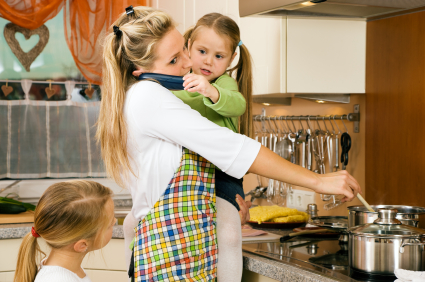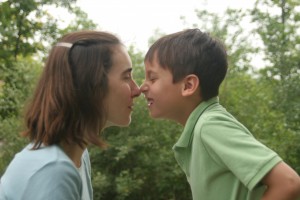
Parenting  Self-expression can be healing and rejuvenating. Many parents of children with special needs have some sort of creative pursuit - photography and scrapbooking, music or writing, sewing or cooking, woodworking or making jewelry, landscaping and gardening.
An Outlet can be something as simple as jotting down a few sentences in a journal or arranging seasonal items on an indoor “nature table.” My husband’s creative outlet is the computer: he composes electronic music and makes movies based on graphic representations of mathematical equations known as fractals. The results are definitely artistic.
Self-expression can be healing and rejuvenating. Many parents of children with special needs have some sort of creative pursuit - photography and scrapbooking, music or writing, sewing or cooking, woodworking or making jewelry, landscaping and gardening.
An Outlet can be something as simple as jotting down a few sentences in a journal or arranging seasonal items on an indoor “nature table.” My husband’s creative outlet is the computer: he composes electronic music and makes movies based on graphic representations of mathematical equations known as fractals. The results are definitely artistic.
8 Essential Tips For Preventing Caregiver Burnout
“Who needs caffeine when I can have adrenaline-fueled adventures all day and all night?” That’s what I used to say when my son was little. By 1 or 2 pm on most days, my hands started trembling from the constant stream of adrenaline. My mind was always on alert because my hyperactive son was an escape artist with a knack for getting himself into dangerous situations. I had to think quickly on the run.Stress Hormones
After my son turned 3, I noticed that the trembling had stopped. The high stress level had become my new normal. Researchers at the University of Wisconsin at Madison found that mothers of children with autism had significantly lower levels of the stress hormone cortisol compared to mothers of children without disabilities. Repeated exposure to stress over time is known to cause diminished stress hormones. The same phenomenon of reduced cortisol levels is also found in soldiers in combat zones who become desensitized to danger.The Symptoms of Caregiver Burnout
Desensitization is one reason why caregiver burnout usually is not recognized by caregivers themselves. The symptoms of burnout overlap with those of depression and Post-Traumatic Stress Disorder:- Fatigue
- Irritability
- Feeling numb or developing an uncaring, negative attitude
- Heightened sensitivity
- Social withdrawal
- Loss of interest in favorite activities
- Frequent illness and/or chronic pain
- Thoughts of self-harm or harming the person with a disability
- Difficulty concentrating
- Changes in sleep patterns
- Changes in appetite and/or weight
- Feelings of hopelessness and/or helplessness
- Reliving upsetting memories
- Inappropriate use of alcohol and/or medication
The Damage
Untreated, caregiver burnout can lead to an inability to function in everyday life. It may also escalate into a life-threatening situation for the person with a disability, the caregiver and possibly other family members. Caregivers need loving support from friends and family. Unfortunately, the behaviors associated with burnout tend to push away friends and family when they are most needed. Fortunately, it is possible to recover from burnout and prevent it from happening again.1. Count your blessings
When I realized that I was in over my head, I made a list of all the people I could call to ask for favors. I asked one friend to bring over lunch and play with my older son while the baby and I took a nap. I asked another friend if she knew of anyone I could hire as a mother’s helper - and she did. I asked my mother to come stay with us for a few days. I called my insurance company and learned that there was a counselor one block from my house whose services were 100% covered. With each phone call I asked for one specific service that would help me. Those favors added up quickly.2. Go to the doctor
Get a complete physical to rule out illnesses that may contribute to burnout. Caregivers often avoid going to the doctor themselves because they don’t want to leave their loved one even for a short time. It’s important to have a back-up caregiver for situations like this. Caregivers may also want to avoid discussing certain health problems. For example, my physician asked me questions about domestic violence when he saw dozens of large bruises on my body. I explained that my husband is gentle and loving, but that I was often injured while protecting my child from accidents. I don’t think the physician believed me, but he stopped asking questions.3. Respite care
Many people do not realize that it may be possible to get respite care through their local community health agency - usually the fee is on a sliding scale, depending on income, and the primary caregiver is permitted to select the respite caregiver. The first step is to get a Person-Centered Plan (PCP) for the person with a disability. The PCP will outline the number of respite hours per month and how it will be paid for. The next step is to select the respite caregiver. It’s a good idea to start with brief respite periods and build up to longer periods as needed.4. Healthy Lifestyle
Find ways to eat nutrient-dense food, exercise more frequently and develop a regular sleep routine. Focus on changing one small thing at a time, for example, taking a walk after dinner or eating a green salad as a snack instead of chips.5. Creative outlets
 Self-expression can be healing and rejuvenating. Many parents of children with special needs have some sort of creative pursuit - photography and scrapbooking, music or writing, sewing or cooking, woodworking or making jewelry, landscaping and gardening.
An Outlet can be something as simple as jotting down a few sentences in a journal or arranging seasonal items on an indoor “nature table.” My husband’s creative outlet is the computer: he composes electronic music and makes movies based on graphic representations of mathematical equations known as fractals. The results are definitely artistic.
Self-expression can be healing and rejuvenating. Many parents of children with special needs have some sort of creative pursuit - photography and scrapbooking, music or writing, sewing or cooking, woodworking or making jewelry, landscaping and gardening.
An Outlet can be something as simple as jotting down a few sentences in a journal or arranging seasonal items on an indoor “nature table.” My husband’s creative outlet is the computer: he composes electronic music and makes movies based on graphic representations of mathematical equations known as fractals. The results are definitely artistic.



